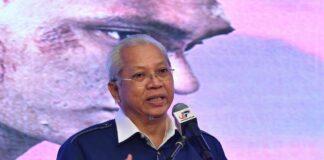KUALA LUMPUR, Aug 22 — Prime Minister Datuk Seri Anwar Ibrahim today said that the government has never neglected the middle 40 per cent (M40) group.
He said the allegation by certain parties that the government’s approach was more focused on the low-income or bottom 40 per cent (B40) group to the extent of neglecting the middle-income group is not true.
“We have taken several approaches but to say that we gave more to the B40 is not true. For example, just look at all science schools or MRSM (Mara Junior Science College) including Malay College and other institutions, the poorest group that really benefitted from it is very small, not even one or two per cent.
“That’s why I proposed to the Minister of Education to have a new type of school specifically for children of the poorest group or allocate one to five per cent of the quota (in the existing schools) to the poorest group. Or else, the disparity will continue to exist.”
Anwar said this at the iTEKAD Networking event at Sasana Kijang here today, which was also attended by Deputy Finance Minister Datuk Seri Ahmad Maslan and Governor of Bank Negara Datuk Shaik Abdul Rasheed Abdul Ghaffour.
On meritocracy in education, the Prime Minister said that while the system is important, it cannot be the sole criterion to ensure fair management and good governance in the country.
“If we want to talk about meritocracy between the best schools in Kuala Lumpur and schools in Kapit, Sarawak, it’s like talking about a formula does not give emphasis on fairness.
“On one hand, there are proponents of meritocracy, and on the other hand, there are proponents of quota (for Bumiputera)…I think the two should be combined; there should also be meritocracy or else, we will not have the best among us,” he said.
Anwar, who is also Finance Minister, therefore urged the relevant ministries, banks and the elite to reach out to the lower-level groups who have different perspectives and concerns on this matter.
“Sometimes I’m worried; we have been independent for so long and we are mature now, but our discourse is divided into two and disconnected between the elite and the lower-level groups.
“When they (lower-level groups) feel neglected and marginalised, they will turn to narrow issues of race and religion because the elite does not empathise with them,” he added.
















